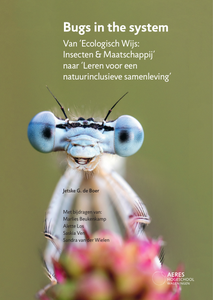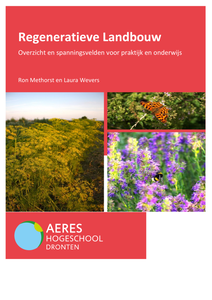Inaugurele rede uitgesproken bij de aanvaarding van het ambt van lector Martijn van der Heide aan Hogeschool Van Hall Larenstein, 23 januari 2025. Het lectoraat 'Biodiversiteit in het landelijk gebied' streeft naar een ruimtelijke inrichting van het landelijk gebied waarin een duurzame landbouw en biodiversiteitsherstel hand in hand gaan. Een toekomst waarin boeren niet alleen als voedselproducenten worden gezien, maar ook als beheerders van het platteland, leveranciers van ecosysteemdiensten en beschermers van biodiversiteit én daar ook voor beloond worden. Door integratie van ecologische kennis met sociaal-economische inzichten, wil het lectoraat bijdragen aan een duurzaam en toekomstbestendig landelijk gebied, waarin biodiversiteit floreert, boeren een toekomstperspectief hebben en de brede welvaart wordt versterkt.
DOCUMENT

Wat zijn kansen en gevolgen van het nieuwe Gemeenschappelijke Landbouwbeleid (GLB) en wat verandert er? Peter van der Maas, lector 'Duurzame watersystemen' aan Hogeschool Van Hall Larenstein leidt de workshop in. Vanaf 36:05 minuten: Jasper van Belle, docent-onderzoeker aan Van Hall Larenstein houdt een voordracht over ecosysteemdiensten van natte veenbodems en waardebepaling door waardering.
LINK
Deze publicatie bestaat uit twee delen: eerst een terugblik op de lectoraatsperiode van 2020-2024. In 'Ecologisch Wijs : Insecten & Maatschappij' speelden insecten een belangrijke rol in het leggen van de verbinding tussen ecologie en educatie. Insecten zijn bijzonder waardevol om begrippen in de ecologie mee uit te leggen. Een uitgebreid deel van de tekst is gewijd aan insecten zodat de lezer meer waardering krijgt voor deze fascinerende dieren. Het maatschappelijke dilemma van het versterken van insectenbiodiversiteit enerzijds en het beheersen van plaaginsecten anderzijds wordt toegelicht. Vervolgens worden de doelstellingen van het lectoraat besproken en een aantal van de opbrengsten van het onderzoek. Het tweede deel van de publicatie is een contourschets van het thema voor de nieuwe lectoraatsperiode 'Leren voor een natuurinclusieve samenleving'.
DOCUMENT

Dit rapport verkent hoe de nog onduidelijk gedefinieerde term regeneratieve landbouw zich verhoudt tot bredere discussies over duurzame landbouw. Het schetst spanningsvelden rond definities (proces - versus resultaatgericht), discours (regeneratief ↔ industrieel-productivistisch) en sociaal-economische context. Centraal staat het streven naar voortdurende vernieuwing van landbouwsystemen door herstel van bodemgezondheid, versterking van biodiversiteit en verbetering van ecosysteemdiensten, vaak gezien als 'een stap verder dan duurzame landbouw'. Daarnaast laat het document zien dat uiteenlopende stakeholders – van onderwijsinstellingen tot multinationals – verschillende accenten en belangen hebben, wat kan leiden tot verwarring, maar ook tot kansen voor dialoog in praktijk en onderwijs.
DOCUMENT

In het project ‘Landbouw in Klimaatrobuuste Beeklandschappen’ (SIA PVG.DZ21.03.004) zijn het bodem- en watersysteem, het agrarisch perspectief, de verdienmogelijkheden binnen dit landschap en de rol van governance uitgewerkt. De methodieken zijn aan de hand van drie verschillende casusgebieden opgesteld, getest en repliceerbaar gemaakt en hebben verschillende producten en rapportages opgeleverd. De gebruikte casusgebieden zijn het Koningsdiep (FR), de Buulder Aa (NB) en het Vechtdal (OV), drie verschillende maar wel vergelijkbare gebieden op zandgronden waar de aanwezigheid van lokale laagtes en hoogtes voor complexe dynamiek zorgen op het gebied van droogte en wateroverlast. Dit deelbestand is onderdeel van het grotere geheel. Houd er rekening mee dat deze informatie is gepubliceerd op 28-02-2025 en onderhevig kan zijn aan wijzigingen.
DOCUMENT

In het project ‘Landbouw in Klimaatrobuuste Beeklandschappen’ (SIA PVG.DZ21.03.004) zijn het bodem- en watersysteem, het agrarisch perspectief, de verdienmogelijkheden binnen dit landschap en de rol van governance uitgewerkt. De methodieken zijn aan de hand van drie verschillende casusgebieden opgesteld, getest en repliceerbaar gemaakt en hebben verschillende producten en rapportages opgeleverd. De gebruikte casusgebieden zijn het Koningsdiep (FR), de Buulder Aa (NB) en het Vechtdal (OV), drie verschillende maar wel vergelijkbare gebieden op zandgronden waar de aanwezigheid van lokale laagtes en hoogtes voor complexe dynamiek zorgen op het gebied van droogte en wateroverlast. Dit deelbestand is onderdeel van het grotere geheel.Houd er rekening mee dat deze informatie is gepubliceerd op 28-02-2025 en onderhevig kan zijn aan wijzigingen.
DOCUMENT

In het project ‘Landbouw in Klimaatrobuuste Beeklandschappen’ (SIA PVG.DZ21.03.004) zijn het bodem- en watersysteem, het agrarisch perspectief, de verdienmogelijkheden binnen dit landschap en de rol van governance uitgewerkt. De methodieken zijn aan de hand van drie verschillende casusgebieden opgesteld, getest en repliceerbaar gemaakt en hebben verschillende producten en rapportages opgeleverd. De gebruikte casusgebieden zijn het Koningsdiep (FR), de Buulder Aa (NB) en het Vechtdal (OV), drie verschillende maar wel vergelijkbare gebieden op zandgronden waar de aanwezigheid van lokale laagtes en hoogtes voor complexe dynamiek zorgen op het gebied van droogte en wateroverlast. Dit deelbestand is onderdeel van het grotere geheel.Houd er rekening mee dat deze informatie is gepubliceerd op 28-02-2025 en onderhevig kan zijn aan wijzigingen.
DOCUMENT

In het project ‘Landbouw in Klimaatrobuuste Beeklandschappen’ (SIA PVG.DZ21.03.004) zijn het bodem- en watersysteem, het agrarisch perspectief, de verdienmogelijkheden binnen dit landschap en de rol van governance uitgewerkt. De methodieken zijn aan de hand van drie verschillende casusgebieden opgesteld, getest en repliceerbaar gemaakt en hebben verschillende producten en rapportages opgeleverd. De gebruikte casusgebieden zijn het Koningsdiep (FR), de Buulder Aa (NB) en het Vechtdal (OV), drie verschillende maar wel vergelijkbare gebieden op zandgronden waar de aanwezigheid van lokale laagtes en hoogtes voor complexe dynamiek zorgen op het gebied van droogte en wateroverlast. Dit deelbestand is onderdeel van het grotere geheel.Houd er rekening mee dat deze informatie is gepubliceerd op 28-02-2025 en onderhevig kan zijn aan wijzigingen.
DOCUMENT

This research study applied the Integrated Energy Landscape Approach and the Ecosystem Services Framework in order to formulate a pre-proposal for a Positive Energy District in the Hoogkerk Zuid neighborhood in Groningen, the Netherlands. The proposed interventions are sufficient to cover the energy usage of the district, while an energy surplus is generated. The pre-proposal has been developed within a participatory process, organized by the authors in close collaboration with key local stakeholders. The identification of the local ecosystem services served as a crucial starting point for this study, while it also provided the transparent information base for analyzing the subsequent trade-offs and synergies derived by the proposed energy transition interventions. Then, a sustainable business case model has been developed based on this Positive Energy District pre-proposal. The main outcome of the model lies within the value creation through cost savings from foregoing traditional energy sources and sale of electricity to the grid, but also through including the economic value of ecosystem services and synergies when integrating the Renewable Energy Technologies. Beyond the local case, the findings lay the groundwork for more systematic studies on merging the methodologies of Positive Energy District development, the Ecosystem Framework and the Integrated Energy Landscape approach. Finally, by adding the benefits of ecosystem services and synergies as a significant contributor in the financial analysis and decision making process, this study opens the door for a new approach of valuing sustainable projects.
DOCUMENT
BackgroundThis research study applied the 'Integrated Energy Landscape Approach and the Ecosystem Services Framework' to formulate a pre-proposal for a Positive Energy District in the Hoogkerk Zuid neighborhood in Groningen, the Netherlands.ResultsThe proposed energy saving and energy generation interventions are sufficient to cover the energy usage of the district, while an energy surplus is generated. The pre-proposal has been developed within a participatory process, organized by the authors in close collaboration with key local stakeholders. The identification of local ecosystem services served as a crucial starting point for this study, while it also served for the basis for analysing the subsequent trade-offs and synergies derived from the proposed energy transition interventions. Then, a sustainable business case model was developed based on this Positive Energy District pre-proposal. The main outcome of the model lies in the value creation through cost savings from not using traditional energy sources and selling electricity to the grid. In addition, the economic value of the preserved ecosystem services and of the synergies generated by the pre-proposal are also included in the model.ConclusionsBeyond the local case, the results lay the groundwork for more systematic studies on merging the methodologies of Positive Energy District development, the Ecosystem Framework and the Integrated Energy Landscape approach. Finally, by adding the benefits of ecosystem services and synergies as a significant contributor in the financial analysis and decision-making process, this study opens the door to a new approach to the evaluation of sustainable projects.
DOCUMENT